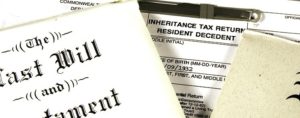You’re familiar with the story of the Three Little Pigs. The pigs build three houses using different materials. The story’s protagonist, the Big Bad Wolf, appears and blows down two of the pigs’ houses, made of straw and sticks. But the third little pig outsmarted the Big Bad Wolf because he made his house out of brick, and it couldn’t be destroyed.
Take the Three Little Pigs analogy and apply it to your life, specifically your estate plan. What is your estate plan like, if you even have one at all? Is it made from straw, sticks or bricks?
The correct answer should be bricks.
Whether you’re creating an estate plan or building a Three Little Pigs house, having the proper building blocks in place is a must.
Estate planning is not just for the wealthy, although people who have accumulated wealth may think more about how to preserve it. Good estate planning is often more impactful for families with modest assets because the loss of time and funds as a result of poor estate planning is more detrimental.
People think that they can put off estate planning because they do not own enough, they are not old enough, it will be costly or confusing, they will have plenty of time to do it later, they do not know where to begin or who can help them, etc… The excuses are endless.
Before putting anything down on paper, let’s start with the basics. What is an estate plan? An estate plan is the process of arranging and distributing of money and property both during and after an individual’s life. These purposes can include specifying who will care for your children if you are unable to do so; avoiding the cost and publicity of probate; and allowing you to name someone to make decisions on your behalf if you become incapacitated.
Do you want to be among the 67 percent of Americans without an estate plan?
An individual can implement numerous estate planning techniques, but the documents considered the critical building blocks to every estate plan are:
- Power of Attorney (POA)
- The will
- Revocable trust
- Living will
By itself, each document alone will fulfill a purpose, but an effective combination of these documents – the foundation, per se – can significantly reduce both emotional and financial strains on your heirs once you pass.
If the estate plan is the foundation, then the POA is the structure’s walls. The POA is a legal document you sign to grant someone you trust with authority to make decisions on your behalf. The document is signed when you are still mentally competent for the POA to be valid. This is a good reason to plan early for your later years, so that your affairs are in order.
Keeping with the POA as a foundation theory, let’s strengthen the foundation one step further. There are different types of POAs, but the two types you are most interested in are financial and health care.
A financial POA is a type of special or limited POA because it gives your representative power to make decisions about your money and property if and only if you become incapacitated. For example, you could grant your representative the authority to:
- Pay your bills and your family’s expenses
- Handle banking business (checking, savings, investments)
- Sell or rent your real estate
- File your taxes
The health care, or medical, POA allows your representative to make health care decisions on your behalf if and only when you’re incapacitated. This could include decisions about your medical care, such as:
- Medical treatment
- Medication
- End-of-life care
A will is a legal document that allows the distribution of his or her property at death, and designates who will be in control of this process at that time. A will is recommended for anyone who is married, owns significant assets, or has young children. Having a will in place will ensure that your assets are divided as you wish, rather than under the applicable state laws.
A will can also be crucial if you have minor children, as it allows you to name a specific guardian to care for your children at your death.
Like a will, a revocable trust is a legal document that specifies how assets should be distributed, but with additional benefits such as the ability to control when and under what circumstances your beneficiary will receive their portion of assets. Unlike wills, trusts are not subject to probate, so your heirs can usually receive their share of assets more quickly and without court approval.
Unlike the health care POA, a living will is a document that spells out medical treatments you would and would not want to be used to keep you alive. Some examples of life-sustaining treatment commonly found in a living will are resuscitation, mechanical ventilation or being fed via a tube. A living will can also be used to stipulate other decisions, such as pain management and organ donation.
Regardless, these documents need to be reviewed every few years to account for any life changes that could materially impact your planning.
Knowing you have a properly prepared plan in place – one that contains your instructions and will protect your family – will give you and your family peace of mind. Estate planning is one of the most thoughtful and considerate things you can do for your loved ones.
Elder Advisers® is not a law firm or a substitute for an attorney. We offer financial advice. We can work closely with your existing tax and legal advisors or introduce you to those we routinely work with. Nothing in this newsletter is intended as tax advice, a solicitation for insurance, or legal advice, and is merely provided as general information, and should not be relied upon for anyone’s specific or unique circumstances. Some content of this newsletter may have been developed by third party sources not affiliated with Elder Advisers®. If you would like to discuss your situation, we are delighted to help. CALL (800) 763-7930.



